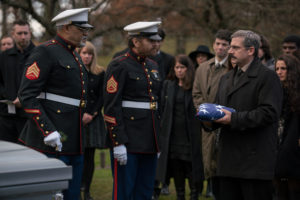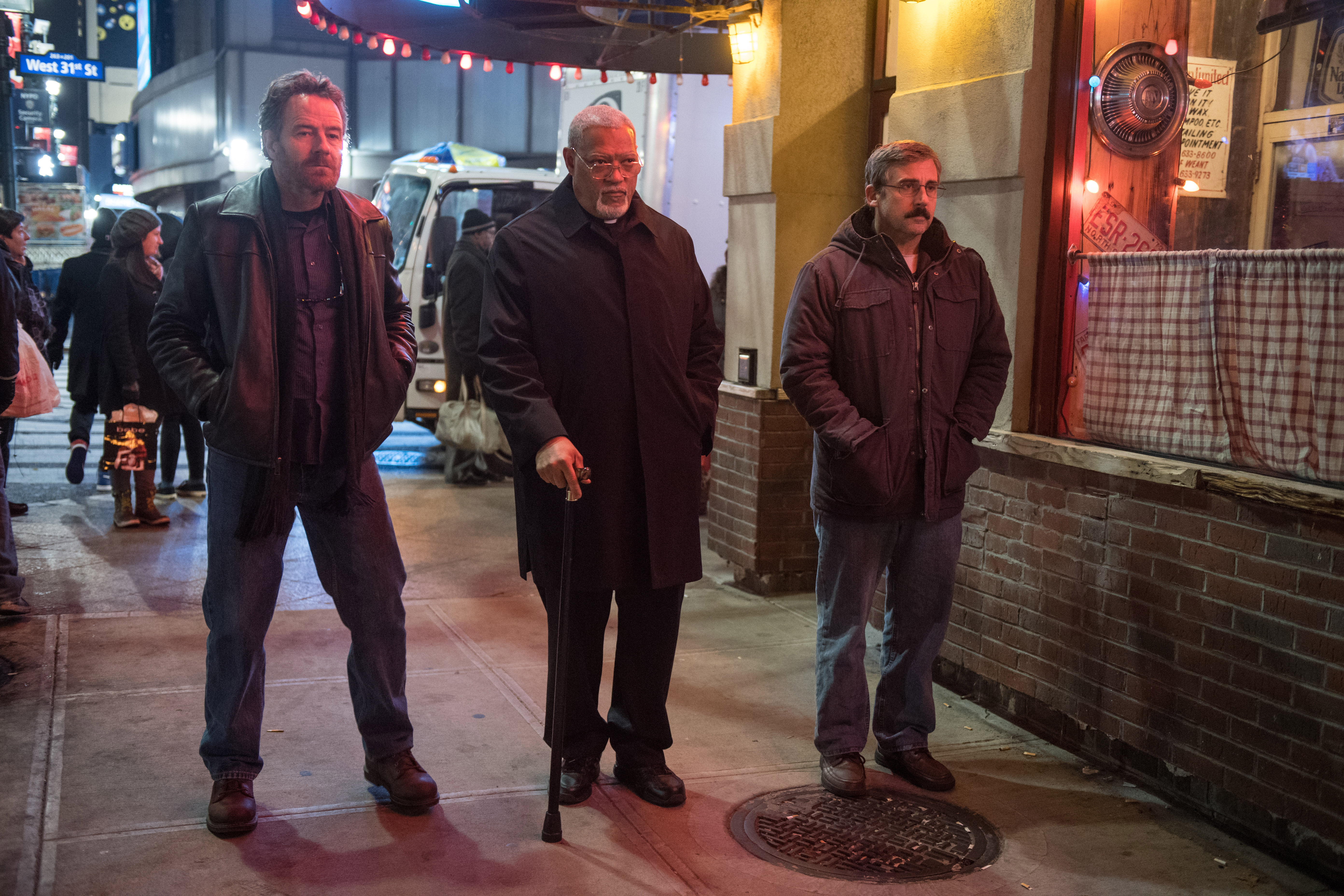Memo to Richard Linklater: 2004 called; it wants its anti-war film back. Oh, if only. Maybe the Hell in Iraq could have been concluded earlier or avoided altogether if movies like this had appeared in a timely fashion and pushed popular opinion in the sane direction. As is, this take on Iraq feels too little, waaaaay too late, and very, very long.
Larry ‘Doc’ Shepherd (Steve Carell) was just informed that his son died in Iraq and is on his way home. This was the only plot point the movie saw fit to include, so you big picture folks can probably leave right now. Now completely solo in life, Larry decides to get the band back together … the ‘Nam Band: Sal Nealon (Bryan Cranston) on synthesized drugs and Reverend Richard Mueller (Laurence Fishburne) on the moral pulsiphone. This is all a fancy way of saying “Road Trip!” with the wild one (Cranston), the uptight one (Fishburne), and the quiet one (Carell). And what more fun could there be had than road trippin’ with your dead son in tow? It’s like Weekend at Bernie’s except completely devoid of humor … so it’s like Weekend at Bernie’s.
At this point, the film had to invent conflict because none leapt at the viewer upon first pass, so we get, in order: the reluctance to go, the phony obituary sold to all grieving parents of GIs, the refusal of interment to the national cemetery at Arlington, the old men mistaken for terrorists (?!), and a few other issues that make even less sense. This film could have ended in record time had Doc simply acceded to the Arlington plan – and, dude, if you can be buried at Arlington, be buried at Arlington; that’s a freaking no brainer.
I grew very frustrated with this film; I understand we’re dealing with professional actors and serious material, but the controversies were fake and the dialogue was poor. Linklater clearly wanted to Linklater-day Iraq to Vietnam, but the handling was sloppy with false controversies and Bryan Cranston reminding us why it took decades for America to figure out who he is. Meanwhile, Steve Carell, in his most subdued role ever, just  sits in a corner thinking about death … or Despicable Me 4, whichever horror is next up for him. Laurence Fishburne gets to stretch the most of the three, reminding us both of current piety and past indiscretion, but if you really want to see him act, go watch What’s Love Got to Do with It?
sits in a corner thinking about death … or Despicable Me 4, whichever horror is next up for him. Laurence Fishburne gets to stretch the most of the three, reminding us both of current piety and past indiscretion, but if you really want to see him act, go watch What’s Love Got to Do with It?
Mostly what bugs me about Last Flag Flying comes down to pacing and tone. This is a bizarrely slow film for such talented people to screen it up and, more importantly, it couldn’t decide what the message ought to be: is this a true protest or a half-assed one? Last Flag Flying constantly wants it both ways – it wants us to understand Iraq and Vietnam were both equivalent, both huge mistakes. It wants us to believe that government intervention was a pointless extension of misplaced paranoia in both cases. I happen to agree with this part. Yet, it also wants us to accept that while military leadership was and is full of bureaucratic pencil-pushing dunces, there’s nothing wrong with US military institutions themselves or the power they wield. Really, fellas? Government alone is all to blame for our over-aggressive hawkishness and subsequent failures? No part of our leadership tragedy has anything to do with the fact that our military and our government have been intertwined since the inception of the United States? Do you know what happens when you get enough suckers to believe the government needs a complete overhaul but the US military shoulders neither responsibility nor blame? President Trump. ‘Nuff said.
Our country, born out of armed assault
Doesn’t lack for war wounds to salt
Is the military to blame
For our aggressive game?
Seems only the government is at fault
Rated R, 125 Minutes
Director: Richard Linklater
Writer: Richard Linklater & Darryl Ponicsan
Genre: Tardy insight
Type of being most likely to enjoy this film: Grieving parents
Type of being least likely to enjoy this film: Bureaucrats



